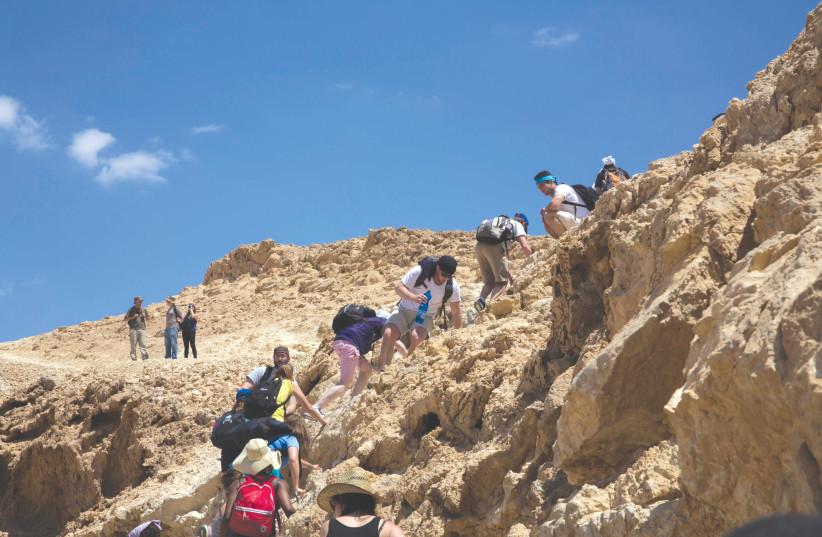For many British Jewish teens, “Israel tour” is a rite of passage; weeks away from the family, miles away from home, with no one to tell you what to do. A totally novel experience for most youngsters of that age and one that will almost certainly leave a lasting impression.
Memories of my own Israel tour came flooding back over the past week or so as my Facebook feed filled up with the posts of anxious parents waving off their children as they embarked on this trip of a lifetime. Happily, these tours have resumed after COVID.
I went on an Israel tour 36 years ago as a 16-year-old Mancunian lass. Although it wasn’t my first time away from home (I’d been on a school skiing trip and stayed with friends in Bournemouth a couple of summers before), it was my first trip to Israel.
As organized activities generally left me cold, I didn’t belong to a youth group, but I didn’t want to miss out on this experience either. Deciding which group to go with wasn’t easy, as I didn’t really fit in anywhere. Not for me the cool, hip Habo (Habonim) tour; I was far too square and straightlaced for that and would have felt totally out of place.
Coming from an irreligious family, BA (Bnei Akiva) wasn’t for me either. In the end, I decided that the RSY (Reform Synagogue Youth) tour was the best option for me. As it turned out, it was all I’d hoped it would be and I had a wonderful, carefree time.

Although I may have been somewhat oblivious to the security measures in place on my tour back in the ’80s, I’m quite certain they weren’t as stringent as they are today. The madrichim (leaders) couldn’t have been much older than me and for the first time in my life I was free to do whatever I wanted, within reason.
We spent time on a kibbutz, where I’ll never forget having to get up at 4 a.m. to start work in the fields, followed by a mid-morning shift in the kitchens. The rest of the time was spent lounging around the kibbutz pool, annoying the residents with our “singing.”
We were also invited to stay with local families in Rosh Pina for Shabbat, providing me and many others with our first taste of Israeli family life. The family with whom my friend and I stayed (we were split into pairs) welcomed us in typical Israeli style with such warmth and generosity. Coming from a traditional middle class, English, Jewish family, this was a real eye-opener for me and an experience I’ve always cherished.
Those with family in Israel were also able to break off from the group for a weekend to visit them or even stay in Israel at the end of the tour for an extended holiday if they wished, something that isn’t possible these days.
We explored every inch of the country (or so it seemed) with a freedom that, quite simply, isn’t afforded to kids embarking on such trips today. If memory serves, we were provided with an armed guard on coach trips and tiyulim, but that was the extent of it.
By contrast, each group currently on tour here is accompanied at all times by an armed guard, with extra guards on hand at certain times.
No more free time
Whereas free time meant just that in my day, sadly, this isn’t so any longer. Kids on tour today are supervised round the clock, even during their “free time.” They are not allowed to leave the group for any reason or at any time, even to stay with family or friends. Every youth hostel, every hotel, every campsite where these children rest their weary heads at the end of the day is secured with a ring of steel.
Another constraint is the mobile phone. Phones are allowed on tour, thus enabling regular contact with parents back home and even the tracking of one’s child as the tour progresses. While this of course wasn’t possible in my day, it provides extra peace of mind for the parents and kids alike, but is it a good thing?
Surely one of the main objectives of the trip is to give the children independence and space in which to grow in a safe and controlled environment. The ability to reach for the phone when a problem occurs may not be in everyone’s best interests. That said, being responsible for other people’s children is, on any view, an onerous task. Naturally, security is bound to be uppermost on everyone’s minds.
I can’t help being struck, however, by the irony that I and many others like me have brought our children to live in Israel so they could live as Jews openly, freely and without fear; free of the scourge of antisemitism and the dangers that go hand in hand with it.
All the while, those children who visit Israel on tour are transported around the country in an armed bubble, forbidden from experiencing that freedom and joy their Israeli peers are fortunate enough to have.
The writer is a former lawyer from Manchester, England. She now lives in Netanya, where she spends most of her time writing and enjoying her new life in Israel.
